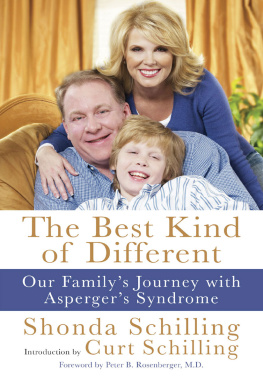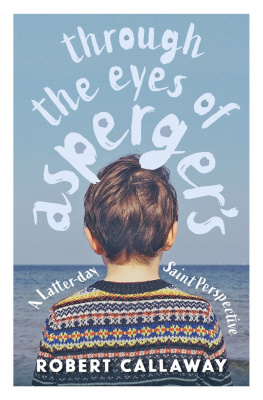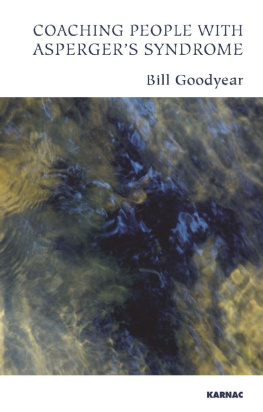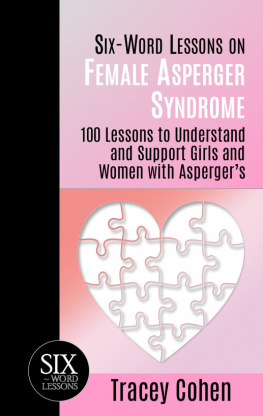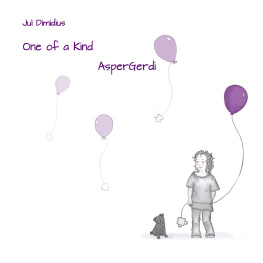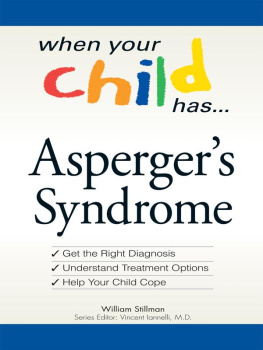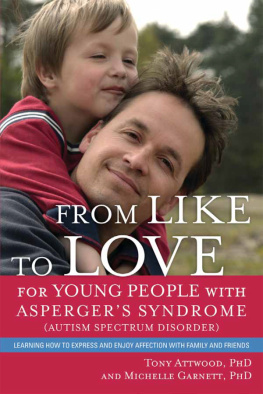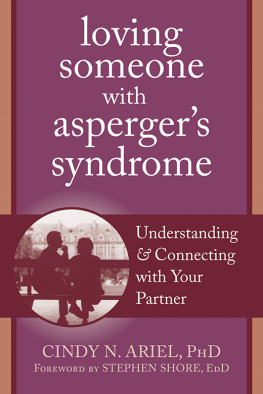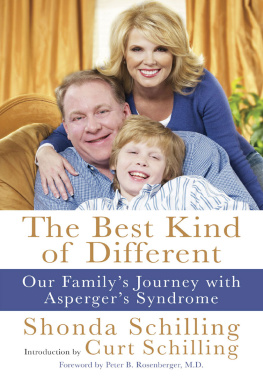Schilling Curt - The best kind of different: our familys journey with aspergers syndrome
Here you can read online Schilling Curt - The best kind of different: our familys journey with aspergers syndrome full text of the book (entire story) in english for free. Download pdf and epub, get meaning, cover and reviews about this ebook. year: 2014;2010, publisher: HarperCollins e-Books, genre: Home and family. Description of the work, (preface) as well as reviews are available. Best literature library LitArk.com created for fans of good reading and offers a wide selection of genres:
Romance novel
Science fiction
Adventure
Detective
Science
History
Home and family
Prose
Art
Politics
Computer
Non-fiction
Religion
Business
Children
Humor
Choose a favorite category and find really read worthwhile books. Enjoy immersion in the world of imagination, feel the emotions of the characters or learn something new for yourself, make an fascinating discovery.
- Book:The best kind of different: our familys journey with aspergers syndrome
- Author:
- Publisher:HarperCollins e-Books
- Genre:
- Year:2014;2010
- Rating:3 / 5
- Favourites:Add to favourites
- Your mark:
- 60
- 1
- 2
- 3
- 4
- 5
The best kind of different: our familys journey with aspergers syndrome: summary, description and annotation
We offer to read an annotation, description, summary or preface (depends on what the author of the book "The best kind of different: our familys journey with aspergers syndrome" wrote himself). If you haven't found the necessary information about the book — write in the comments, we will try to find it.
Schilling Curt: author's other books
Who wrote The best kind of different: our familys journey with aspergers syndrome? Find out the surname, the name of the author of the book and a list of all author's works by series.
The best kind of different: our familys journey with aspergers syndrome — read online for free the complete book (whole text) full work
Below is the text of the book, divided by pages. System saving the place of the last page read, allows you to conveniently read the book "The best kind of different: our familys journey with aspergers syndrome" online for free, without having to search again every time where you left off. Put a bookmark, and you can go to the page where you finished reading at any time.
Font size:
Interval:
Bookmark:
This book is dedicated to my family and friends, without whom this journey would have never been possible. Your love and support has sustained me and driven me to be a better mother, wife, and friend.
And to Grant, whose endless love makes every day a new adventure.
S HONDA AND C URT S CHILLING FIRST BROUGHT THEIR SON Grant to see me the summer of 2007. At that time, he was about to be in second grade and at seven-and-a-half-years old, he was having problems with behavior and classroom function. For a number of reasons, it seemed that attention deficit was playing a role in his behavior; however, on my first encounter with Grant it was clear that something else was involveda basic problem with social interaction. It was then that I raised the likelihood that Grants struggles were the result of Asperger syndrome.
The Schillings are justifiably proud of their children, and initially this was a bitter pill for them to swallow. Their response was first to provide Grant with the best intervention available, and second to learn everything they could about the disorder. The result is that two-and-a-half years later, Grant and his family are managing as well as any family I have had with this diagnosis.
So, what is this disorder? In 1944 Hans Asperger, an Austrian pediatrician with a special interest in exceptional children, published a report in a German psychiatric journal under the title The Autistic Psychopathies of Childhood. While Asperger himself achieved prominence in academic medicine after the war, the report languished in obscurity, and was not even translated into English until 1991.
The four cases described in considerable detail by Asperger in the original report formed the core of what is now known as Asperger syndrome. As soon as the report came to light, readers recognized the remarkable similarities between Aspergers children and those described in 1943 by Leo Kanner, the Austrian psychiatrist who was the first to describe infantile autism. Although Kanner and Asperger never met, both had borrowed the term autistic, coined decades earlier by the Swiss psychiatrist Eugen Bleuler, to describe a peculiar type of thinking, driven primarily not by perceptions but by feelings. Both Kanner and Asperger observed in their children a fundamental incapacity for social interaction, along with restricted repertoires of behavior, fixations of interest on certain objects or subjects, abnormalities of language, and atypical responses to sensory input of all kinds.
While the similarities between the two groups are obvious, the differences are just as striking. The Asperger children tend to be of average intelligence and have better language skills than Kanners autists, many of whom are mute. Though both groups share an inability to conceive of what is going on in another persons mind, in the Asperger cases, this deficit can be limited, requiring more sophisticated tests to identify it. In addition, an Asperger child may be relatively comfortable with physical expressions of affection, although most autistic children struggle with this. Strikingly preserved abilities (savant skills) exist in both groups, but they are more dramatically demonstrated by the Asperger children. Both syndromes are more likely in boys than girls, but this gender difference is more pronounced for the Asperger group. While the Asperger person may be socially clumsy, he is less likely than the Kanner autist to be totally oblivious of the humanity of other people in the room, treating them like pieces of the furniture.
These clinical differences between Asperger syndrome and autism have inevitably raised the issue of whether the two are different disorders, or whether the one is merely a milder form of the other. The controversy persists, although the conventional wisdom today is that the autistic disorders occur along a spectrum, of both type and severity. Autism spectrum disorder is in fact currently the favored term among many prominent clinicians, and will probably appear as such in the next edition of the Diagnostic and Statistical Manual of Mental Disorder s published by the American Psychiatric Association.
On the whole, autistic thinking displays a lack of awareness of what another person is feeling. This is best tested in kids by posing situations in which the thoughts of another person are contrary to fact. The classic example goes likes this: Sally has a basket; Annie has a box. Sally has a ball in her basket. Sally leaves the room, and while she is away, naughty Annie takes the ball from Sallys basket and hides it in her own box. Sally returns to the room. She wants to play with her ball. Where does she look for it? A normal child will respond, In the basket. Why? Because thats where she thinks it is. A child with autistic spectrum disorder will answer, In the box. Why? Because thats where it is, silly.
In people with Asperger syndrome, this type of thinking can stand out in stark contrast to their otherwise highly developed abilities. Popular understanding of Asperger syndrome has been greatly enhanced by the comic strip Dilbert , which deals with a highly intelligent engineer trying to cope with corporate idiocy. Dilberts superiors, from the CEO down to his pointy-haired department manager, are indeed numbskulls. However, Dilbert expresses his frustrations so maladroitly that he insults his bosses, alienates customers, and torpedoes all prospective romantic relationships on the first date. In so doing he makes clear to us that whether a particular stance is moderate or extreme depends upon your point of view. One persons frankness is another persons rudeness, and that persons tact is yet another persons hypocrisy.
Similarly, children on the autism spectrum can have prodigious reading mechanics and spelling skills, yet not the slightest clue of the message intended by the sentence or paragraph, particularly if it is a social one. On standard intelligence tests, they do relatively well on measures of rote information, immediate memory, and block design, but poorly on social comprehension (What do you do if you find a stamped letter lying on the street?) or arranging pictures in sequence to tell a story. Then there are the savant skills that some display. Though not all can do it, a common skill for Asperger children is to tell the day of the week on which a particular calendar date will occur, for as much as a hundred years in the past or future. I once had a teenage patient who could tell me the product of any pair of two- or three-digit numbers instantly upon hearing the numbers spoken. Another patient, nine years old, could tell me the make of any automobile, domestic or foreign, from a picture of the taillight. It is still not clear whether such skills occur because the childs brain is different, or simply because he obsessively pours all of his cognitive effort into a limited number or skills.
A typical responses to the outside world are another feature of all autistic syndromes. The same child who responds to your voice as if he were stone deaf will hold his ears in fright when the fire truck goes down the street three blocks away. They can also show revulsion for other sensory stimuli, such as the texture of certain foods, wool socks, or the labels on shirt collars. This response is termed sensory defensiveness by occupational therapists, and is occasionally seen in the absence of any other autistic features. On the other hand, some more severely autistic children who recoil from affectionate personal contact will enjoy rough handling and horseplay.
Given the variety of ways in which the syndrome shows itself, parenting a child with Asperger syndrome poses a unique and trying set of challenges. For one thing, many common parenting instincts frequently have to be reined inmost notably the desire to hug and show physical affection with the child. Because of their sensitivity to touch, many Asperger children struggle with being hugged by their parents. Their verbal behavior can often appear rude or dismissive, but again this is largely rooted in the fact that they dont process language in the same way that you or I do.
Font size:
Interval:
Bookmark:
Similar books «The best kind of different: our familys journey with aspergers syndrome»
Look at similar books to The best kind of different: our familys journey with aspergers syndrome. We have selected literature similar in name and meaning in the hope of providing readers with more options to find new, interesting, not yet read works.
Discussion, reviews of the book The best kind of different: our familys journey with aspergers syndrome and just readers' own opinions. Leave your comments, write what you think about the work, its meaning or the main characters. Specify what exactly you liked and what you didn't like, and why you think so.

